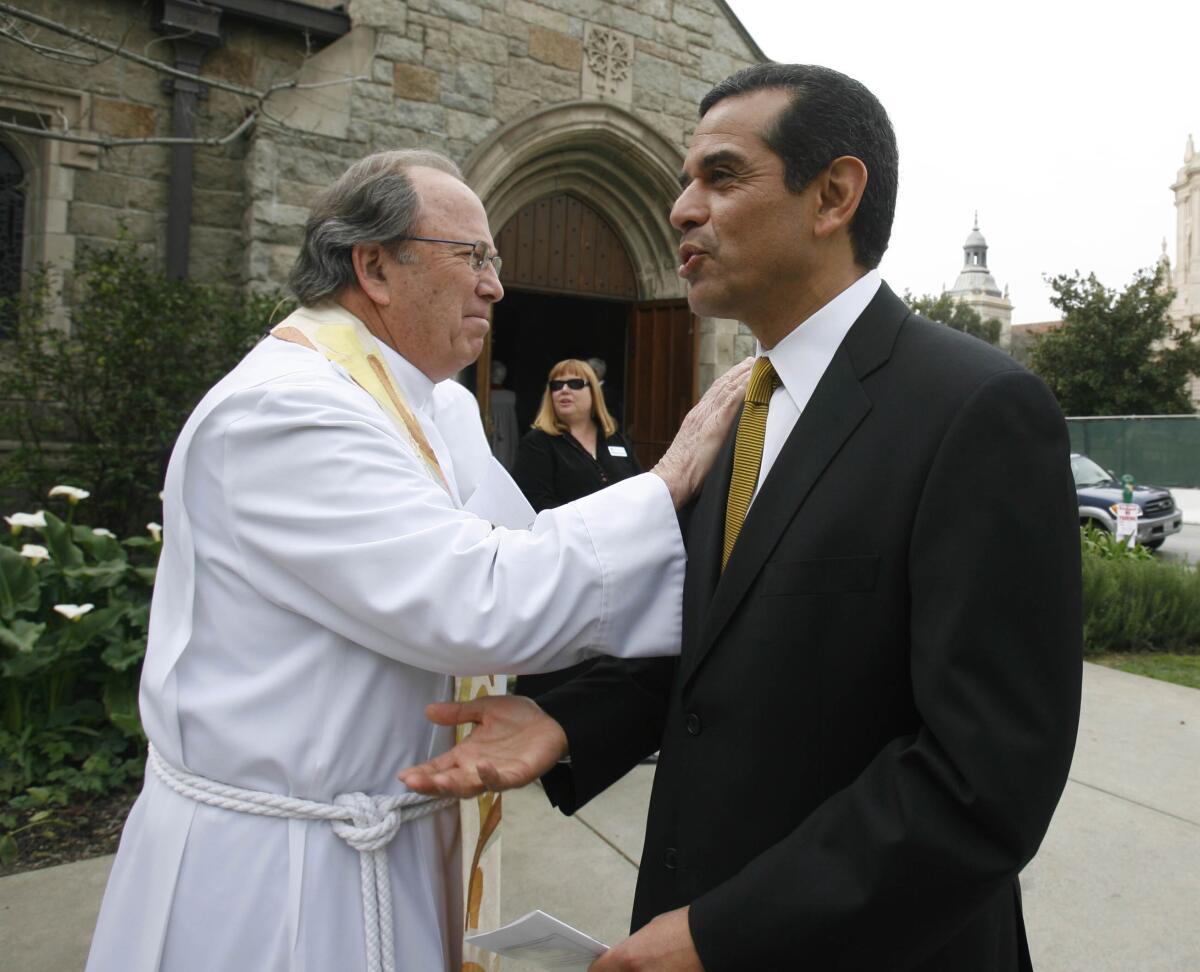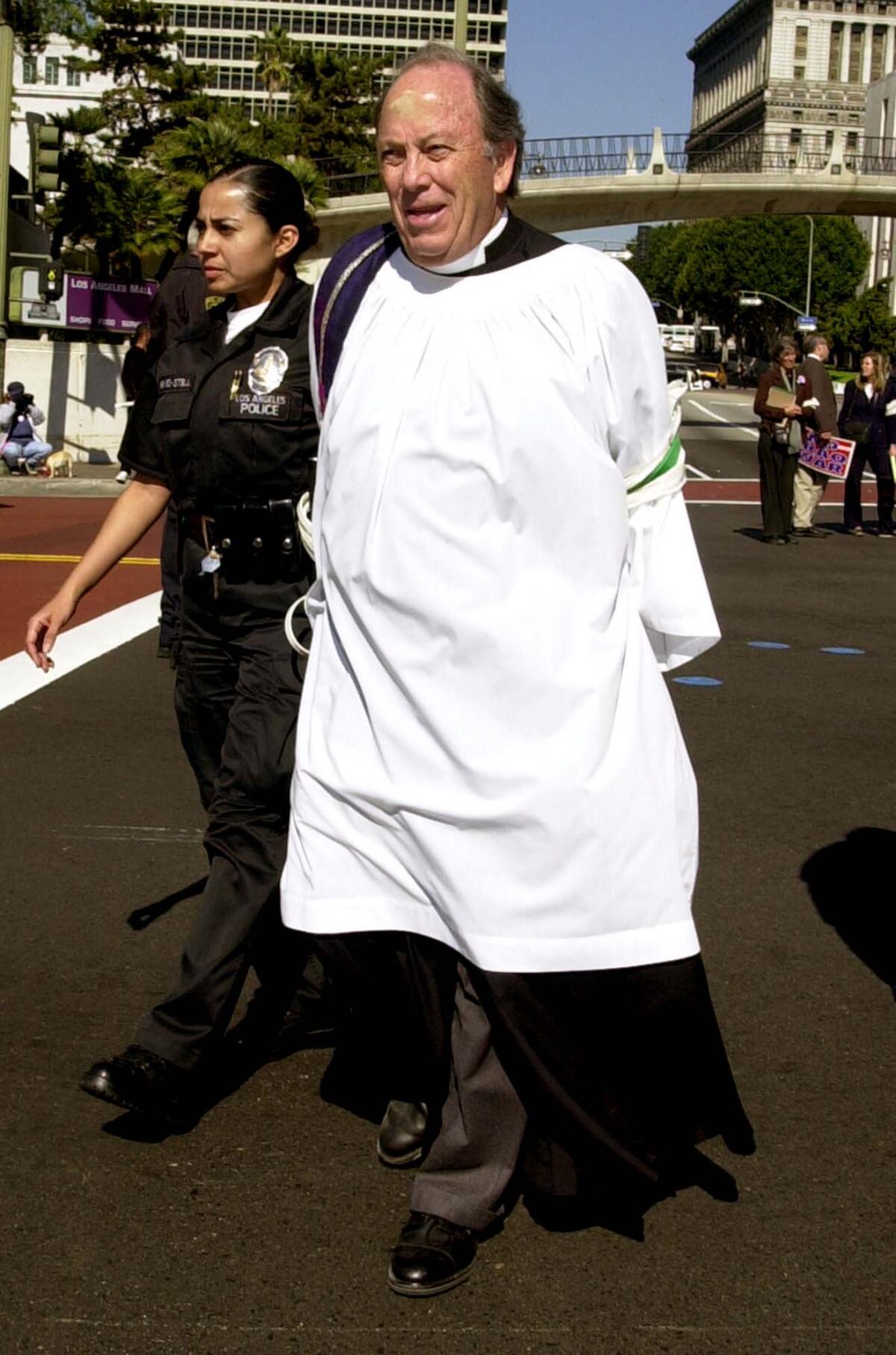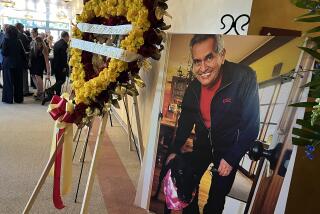George Regas, progressive crusader and longtime rector of All Saints in Pasadena, dies at 90

George Regas, a longtime rector of All Saints Church in Pasadena and pioneering crusader for progressive causes who opposed the Vietnam War and embraced gay marriage, died Sunday. He was 90..
Regas died at his Pasadena home after an infection not related to the coronavirus, according to the Episcopal Diocese of Los Angeles.
For the record:
4:09 p.m. Jan. 7, 2021An earlier version of this article said Regas was arrested in 2014 during a protest against the war in Afghanistan. He was arrested in 2011.
When Regas, a native of Tennessee who was raised in the Greek Orthodox church, arrived in Pasadena in 1967, All Saints was a far cry from the liberal bastion it later became.
Gary Hall, who attended All Saints at the time and was later dean of Washington National Cathedral, described the congregation as a “typical country club parish.”
Regas, who was 37 when he took the helm at All Saints, was not afraid to cause a stir. After he preached an anti-Vietnam War sermon in 1971, some parishioners launched a failed attempt to oust him.
Years later, as rector emeritus, Regas’ pacifist beliefs again attracted attention, this time from the Internal Revenue Service.
In a 2004 sermon that imagined Jesus debating presidential candidates George W. Bush and John Kerry, Regas toed the line between expressing his religious values and political campaigning, an act that would jeopardize the church’s tax-exempt status.
At one point in the sermon, which Regas delivered two days before the election, Jesus said to both candidates: “The sin at the heart of this war against Iraq is your belief that an American life is of more value than an Iraqi life, that an American child is more precious than an Iraqi baby.”
The IRS sent a warning letter and launched a lengthy investigation, which it ended in 2007 without imposing penalties. But the agency noted in a letter to the church that it still considered Regas’ sermon to be illegal.
Regas sometimes took his antiwar beliefs to the streets and was arrested multiple times, including in 2003 to protest the U.S. invasion of Iraq. A photo from 2011 shows him in a purple cassock and handcuffs, flanked by two police officers, after being arrested during a protest against the war in Afghanistan.

“You don’t grow up in the Episcopal church and not know the name George Regas,” said All Saints Rector Mike Kinman, who has led the church since 2016. “Every major issue that the church was moving forward on, George was on the forefront.”
Regas, who retired in 1995 after nearly 30 years as the head of All Saints, often said that a good preacher had a Bible in one hand and a newspaper in the other.
“You can’t read the Hebrew prophets and not hear that cry for justice,” he said in a 2014 interview with the Times. “The same thing in Islam — the righteous person shares with his brothers and sisters.”
Regas was born on Oct. 1, 1930, in Knoxville, Tenn., and baptized into the Greek Orthodox Church. His mother died when he was 5. His father, a Greek immigrant, owned a restaurant.
As a child, Regas attended Orthodox services held at the local Episcopal church. He befriended the Episcopalian rector and eventually joined the congregation.
Regas went to seminary after college, studied abroad and almost became a theologian until health problems brought him back to the United States. After stints with congregations in Tennessee and New York state, he arrived in Pasadena.
“A lot of people had issues with George, but he didn’t let people intimidate him,” said Mary Regas, his wife of almost 44 years.
While her husband was firm in his convictions, he was neither harsh nor judgmental, she said.
“George could stand up against some of the worst evils, but he was never a scold,” Kinman said. “He always came from a place of love.”
Regas’ deeply held views about equality led him to support same-sex unions in 1992, well before they were accepted in mainstream society.
After years of appeals from gay and lesbian parishioners to bless their unions, Regas began what he called “a long pilgrimage” to research and study the topic. He deliberated, prayed and asked questions such as whether the blessings were Biblical and whether the ceremonies should be public. He also consulted the LGBTQ community.
The issue, along with the consecration of gay bishops, split the Episcopal Church for years, with conservative parishes breaking away to start a rival church.
In 2012, the Episcopal Church arrived at the place where Regas had landed long before, approving a liturgy allowing priests to bless the unions of gay and lesbian couples.
“In 1992, I began blessing same-sex unions at the altar,” he said in the 2014 interview. “To think that we were doing that 20 years ago, and we survived. It showed that religion could be a place for all people.”
Susan Russell, an assisting priest at All Saints, said Regas “literally paved the way” for women to become church leaders and for her to marry her wife.
“For all of his larger-than-life persona, there was also a grounded humility to George Regas — that he didn’t have all of the answers, that he turned to God to feed him and guide him, that he turned to the community to be part of the process,” Russell said.
Regas put his belief in interfaith dialogue into practice. Two of his closest friends were Leonard Beerman, a rabbi and activist who died in 2014, and Hassan Hathout, a physician, poet and leader of the Islamic Center of Southern California.
Regas met Beerman in 1967 at an antiwar rally.
During their nearly 50-year friendship, they met regularly at Patys Restaurant, a diner midway between Pasadena and West L.A., where they would talk about pressing issues, their worries and fears. They attended each other’s services and borrowed ideas from each other — “sometimes attributed, sometimes not,” said Beerman’s widow, Joan Beerman.
Regas and Hathout bonded over their genuine interest in each other’s religions, said Hathout’s daughter, Eba Hathout.
During the Persian Gulf War, Regas, Beerman and Hathout organized weekly prayer services for Muslims, Christians and Jews to worship together.
Amid his activism, Regas attended to the spiritual needs of his congregation.
In the final days of his illness, people told stories about how he consoled them through a divorce or a spouse’s death, or how he helped them achieve their own ideals, such as becoming a conscientious objector.
“George had impact that was enormous in scale, but perhaps the biggest impact he had was one person at a time,” Kinman said. “Those are lives that are forever changed by him.”
Regas is survived by his wife, Mary; his children, Susan Regas, Tim Regas and Tyler Regas; as well as Mary’s sons, Lowry Smith and Burke Smith. Regas’ daughter, Michelle Regas Worrel, died in 2002.
More to Read
Sign up for Essential California
The most important California stories and recommendations in your inbox every morning.
You may occasionally receive promotional content from the Los Angeles Times.











